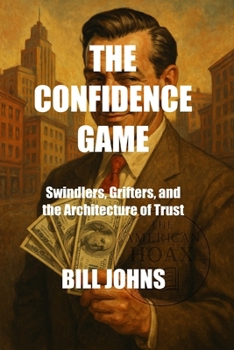The Confidence Game: Swindlers, Grifters, and the Architecture of Trust
What do a con man, patent medicine peddler, a catfishing scammer, a televangelist, and a crypto pitchman have in common? They all traffic in trust-offering hope, identity, healing, or wealth-then quietly extracting belief for profit. In The Confidence Game-Swindlers, Grifters, and the Architecture of Trust, historian and cultural analyst Bill Johns takes readers deep inside the systems of deception that have shaped American life, from the earliest frontier cons to the modern spectacle of media fraud and algorithmic persuasion. Combining literary nonfiction with forensic inquiry, this book reveals that the grift is not an outlier but an architecture-scaffolded by institutions, illusions, and our most intimate needs. From 19th-century boulevards where William Thompson pioneered the urban con, to the code-stained platforms of today's internet where synthetic identities thrive, The Confidence Game charts the evolution of manipulation through language, design, and belief. Each chapter acts as a portal into a different domain of the swindle: the seductive speech of the street grifter, the religious theater of televangelism, the hypnotic loops of multi-level marketing, the whispered lies of the psychic trade, the polished branding of fake charities, and the encrypted obfuscations of blockchain scams. These aren't isolated crimes-they are persistent structures engineered to exploit trust in the same way an architect exploits gravity: not by opposing it, but by working within its rules. The book is organized in five narrative movements that explore the theatricality, national mythos, belief systems, digital infrastructures, and institutional shadows of the con. This is not merely a rogues' gallery, though readers will encounter figures like Charles Ponzi, Victor Lustig, and Anna Sorokin alongside lesser-known fraudsters whose exploits shaped public faith and its undoing. Rather, the heart of this book lies in the mark-the victim whose trust was turned against them. Through these stories, The Confidence Game illuminates the psychology of betrayal, the social shame of being fooled, and the haunting question that follows exposure: if trust can be so easily manufactured, then how can we live without it? In a cultural moment saturated with disinformation, deepfakes, and monetized manipulation, The Confidence Game offers both a warning and a mirror. To trace the mechanics of the swindle is not to escape its reach, but to better recognize its design in the world around us. From government reassurance campaigns to influencer myths, from glossy charity appeals to crypto whitepapers, the modern world is constructed atop layers of persuasive architecture, all engineered to feel truthful enough. This book reveals that belief is not a bug in the system-it is the system. Whether you are a student of American history, a cybersecurity professional tracking phishing schemes, a journalist covering institutional failure, or simply a reader drawn to the human mysteries of persuasion and performance, The Confidence Game invites you to look again-at trust, at illusion, and at what it means to believe. In the end, the con artist doesn't just steal money. They steal something far more difficult to recover: the architecture of meaning itself. This is a book for anyone who has ever wondered not just how we are fooled, but why we need to believe at all.
Format:Paperback
Language:English
ISBN:B0FK5HXYDL
ISBN13:9798294440503
Release Date:July 2025
Publisher:Independently Published
Length:484 Pages
Weight:1.41 lbs.
Dimensions:1.0" x 6.0" x 9.0"
Related Subjects
HistoryCustomer Reviews
0 rating





